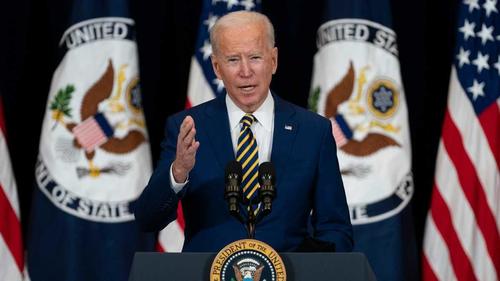
On Thursday afternoon President Biden gave a much anticipated and wide-ranging speech laying out his foreign policy agenda during a visit to the State Department. As expected much of it was a repudiation of Trump’s “America First” vision – though without mentioning Donald Trump by name. His address to State Department diplomats and staff was centered around the theme of his words: “America is back. Diplomacy is back at the center of our foreign policy.”
Alarming for anyone who has called for an end to the vision which sees Washington as essentially acting the like to ‘global police force’ – which unfortunately became a (disastrous) reality starting in the Bush years and under the neocons, Biden vowed that as commander-in-chief he would “defend democracy globally”.
He urged for the US to rebuild “the muscles of democratic alliances that have atrophied from four years of neglect and abuse.” He emphasized that “We can’t do it alone.”
Of course, the big question is what will that look like, with many expecting a return to the kind of ‘humanitarian interventionism’ abroad and liberal internationalism that defined the Obama years. This often took the form of covert wars (with the foremost example being Syria) and military interventions under the guise international coalitions (such as NATO’s war on Libya) aimed at regime change.
“We must meet this new moment of accelerating global challenges – from a pandemic to the climate crisis to nuclear proliferation – that will only be solved by nations working together in common cause,” Biden said in the afternoon address. “That must start with diplomacy, rooted in America’s most cherished democratic values: defending freedom, championing opportunity, upholding universal rights, respecting the rule of law, treating every person with dignity.”
Here are some of the highlights and significant foreign policy changes in US posture…
Russia
Biden said that “we will not hesitate to raise the costs on Russia.” At a moment Russian opposition leaders are lobbying Washington for the targeted use of Magnitsky sanctions on Putin’s inner circle, Biden actually mentioned the imprisoned opposition activist Alexey Navalny by name.
He called on the Kremlin to release Navalny “immediately and without condition” while expressing that authorities had targeted him for “exposing corruption” of Putin and top Kremlin leadership. And further:
He said that he “made it clear to President Putin, in a manner very different from my predecessor, that the days the United States rolling over in the face of Russia’s aggressive action” – pointing to cyber attacks from the SolarWinds breach and the poisoning of opposition figure Alexei Navalny – “are over.”
President Biden on Russia and Alexei Navalny:
"The politically motivated jailing of Alexei Navalny and the Russian efforts to suppress freedom of expression and peaceful assembly are a matter of deep concern to us … He's been targeted — targeted for exposing corruption." pic.twitter.com/WBq2OXvaDB
— NBC News (@NBCNews) February 4, 2021
Yemen
As expected, the president announced the formal end of US offensive operations in the war-torn country:
Biden announced an end to all American support for offensive operations in Yemen and said he will appoint an envoy to focus on the long-standing conflict. Calling the conflict “a war that has created humanitarian and strategic catastrophe,” Biden also made clear the US will “continue help and support to Saudi Arabia.”
While it was announced earlier that a “pause” on all weapons transfers to Saudi Arabia and UAE would take immediate effect for an executive review, it’s unclear precisely what it means that the US will continue its “support” for the Saudis as they continue pummeling Yemen with bombs.
Countering China; Myanmar Coup
Biden emphasized the need to counter China:
“American leadership must meet this new moment of advancing authoritarianism, including the growing determination of China to rival the United States and the determination of Russia to damage our democracy,” he said.
He also addressed the Myanmar crisis, vowing to “impose consequences” – likely in the form of targeted sanctions against military leaders who oversaw the arrests of civilian leaders.
“The Burmese military should relinquish the power they have seized, release the activists and officials they have detained, lift the restrictions on telecommunications and refrain from violence.”
Prez Biden FP Speech:
• Tough lines on China, Russia
• Action to come on #Myanmar
• Engaging adversaries
• Ending offensive support in Yemen
• Suspending US troops withdrawal from Germany
• Refugees admission https://t.co/wmLPrtwOaC— Joyce Karam (@Joyce_Karam) February 4, 2021
Halting Trump’s troop draw downs
Biden noted in the speech that Defense Secretary Lloyd Austin will soon be overseeing a global posture review, which will require halting the Trump-ordered troop draw downs from Germany for the time being.
“America’s alliances are among our greatest assets, and leading with diplomacy means standing shoulder to shoulder with our allies and key partners once more,” he said.
Defending Freedom & Democracy Abroad in ‘New Era’
Emphasizing during the introductory portion of his remarks that there will be a ‘new era’ in US foreign policy, he said the US will return to strengthening alliances through greater engagement and diplomacy which is rooted in America’s “most cherished democratic values.” And further:
In his first major foreign policy address as president, Biden said that defending freedom, championing opportunity, upholding universal rights and respecting the rule of law are “the grounding wire of our global power” and give the U.S. “an abiding advantage” on the world stage.
“Though many of these values have come under intense pressure in recent years, even pushed to the brink in the last few weeks, the American people are going to merge from this stronger, more determined and better equipped to unite the world in fighting to defend democracy – because we have fought for it ourselves,” he added in the prepared remarks.
Via Zero Hedge
